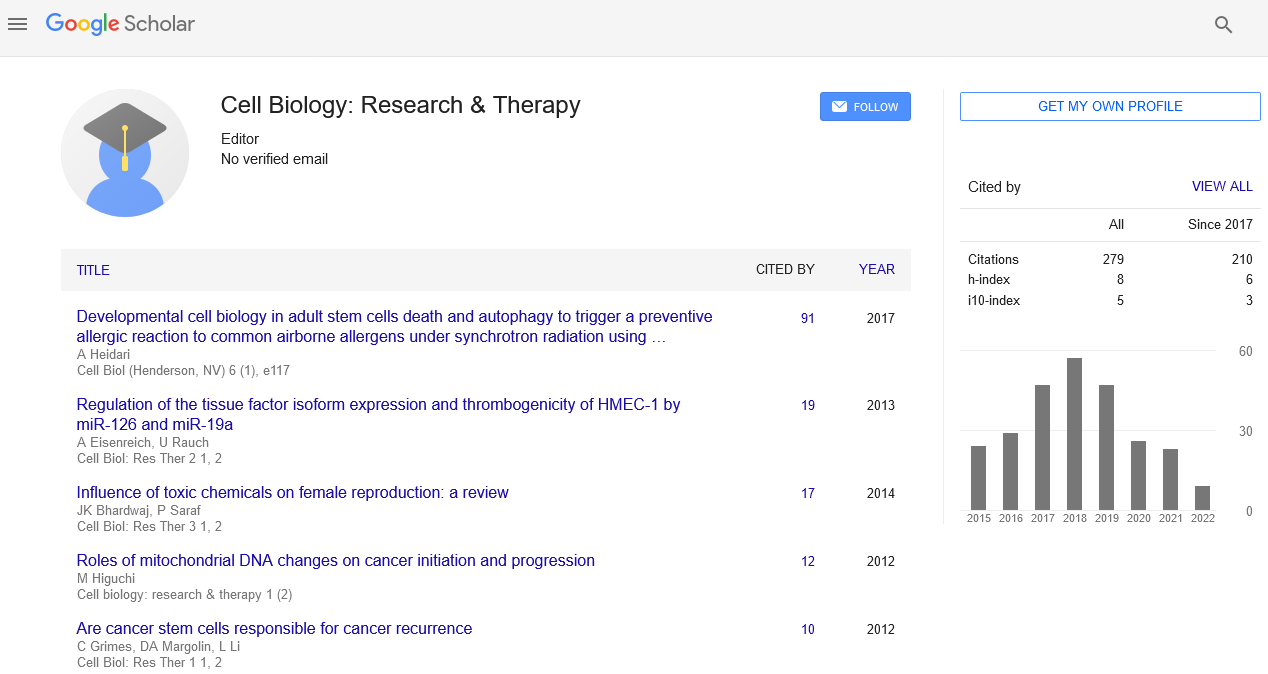Commentary, Cell Biol Vol: 12 Issue: 2
The Treatment of Gene Cloning Therapy in Genetic Medicine
Yubao Weiping*
1Department of Microbiology and Immunology, Guangzhou Medical University, Guangzhou, China
*Corresponding Author: Yubao Weiping,
Department of Microbiology and
Immunology, Guangzhou Medical University, Guangzhou, China
E-mail: weiping@yu.cn
Received date: 22 May, 2023, Manuscript No. CBRT-23-105020;
Editor assigned date: 24 May, 2023, PreQC No. CBRT-23-105020 (PQ);
Reviewed date: 07 June, 2023, QC No. CBRT-23-105020;
Revised date: 14 June, 2023, Manuscript No. CBRT-23-105020 (R);
Published date: 21 June, 2023 DOI: 10.4172/2324-9293.1000178
Citation: Weiping Y (2023) The Treatment of Gene Cloning Therapy in Genetic Medicine. Cell Biol 12:2.
Description
In recent years, the field of gene cloning therapy has emerged as a transformative approach in medicine, offering unprecedented opportunities to treat genetic disorders and other diseases at the molecular level. Through the manipulation and modification of genes, this innovative therapy holds the promise of providing targeted and personalized treatments. This study will explore the principles, advancements, challenges, and future prospects of gene cloning therapy.
Gene cloning therapy
Gene cloning therapy, also known as gene therapy, involves the introduction of genetic material into cells or tissues to correct or modify dysfunctional genes. This can be achieved by various methods, such as delivering therapeutic genes directly into target cells or using viral vectors as vehicles to carry the desired genes.
Principles
The fundamental principle of gene cloning therapy is to address the root cause of a disease by modifying the underlying genetic defect. This therapy aims to introduce functional copies of genes, silence or edit disease-causing genes, or regulate gene expression to restore normal cellular function.
Targeting genetic disorders
Gene cloning therapy shows great promise in the treatment of genetic disorders, which are caused by mutations or abnormalities in specific genes. By correcting the genetic defect at its source, this therapy offers the potential for long-lasting and transformative treatments. It has demonstrated success in conditions such as Severe Combined Immunodeficiency (SCID), cystic fibrosis, and certain types of inherited blindness.
Advancements in delivery systems
One of the key challenges in gene cloning therapy is efficient delivery of therapeutic genes to target cells. Researchers have made significant advancements in developing safe and effective delivery systems, such as viral vectors (e.g., adeno-associated viruses) and nonviral methods (e.g., lipid-based nanoparticles). These delivery systems enable precise and targeted gene transfer, enhancing the efficacy and safety of gene cloning therapy.
Gene editing technologies
The emergence of gene editing technologies, such as CRISPRCas9, has revolutionized the field of gene cloning therapy. These tools allow for precise modifications of specific genes, including gene insertion, deletion, or correction of mutations. Gene editing technologies offer great potential in treating both genetic disorders and acquired diseases, paving the way for precise and personalized therapies.
Challenges and safety considerations
Gene cloning therapy faces challenges and safety considerations. Ensuring the accurate targeting of therapeutic genes, avoiding offtarget effects, and managing potential immune responses are critical considerations in developing safe and effective treatments. Extensive preclinical studies and rigorous clinical trials are necessary to assess the long-term safety and efficacy of gene cloning therapy approaches.
Applications
Gene cloning therapy is not limited to genetic disorders. It holds promise in treating various acquired diseases, including cancer, infectious diseases, and neurological disorders. By targeting diseaseassociated genes or introducing therapeutic genes to enhance the body's natural defense mechanisms, gene cloning therapy opens up new avenues for innovative treatments.
The future of gene cloning therapy lies in personalized medicine, tailoring treatments based on an individual's genetic profile. Advances in genomic sequencing and precision medicine enable the identification of specific genetic abnormalities, paving the way for customized gene cloning therapies. Furthermore, ongoing research in gene cloning therapy holds the potential for innovative combination therapies, where multiple therapeutic genes or approaches are utilized to achieve synergistic effects.
Conclusion
Gene cloning therapy represents a revolutionary approach in medicine, offering the potential to treat genetic disorders and other diseases at their root cause. Through the precise manipulation of genes, this therapy holds great promise for personalized and targeted treatments. While challenges remain, significant advancements in delivery systems, gene editing technologies, and our understanding of genetics are driving the progress of gene cloning therapy.
As research and clinical trials continue, we can anticipate a future where gene cloning therapy becomes a mainstream therapeutic option, transforming the lives of patients affected by genetic disorders and other diseases. With ongoing advancements, future will move closer to a new era of medicine, where the power of genes is harnessed to provide precise and effective treatments, bringing hope to individuals and families worldwide.
 Spanish
Spanish  Chinese
Chinese  Russian
Russian  German
German  French
French  Japanese
Japanese  Portuguese
Portuguese  Hindi
Hindi 